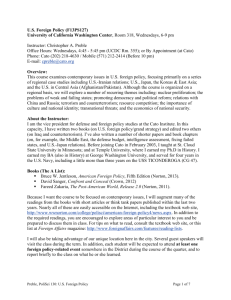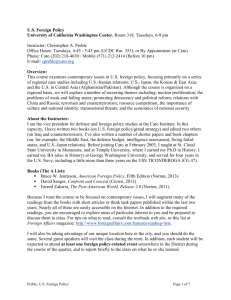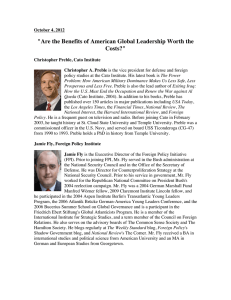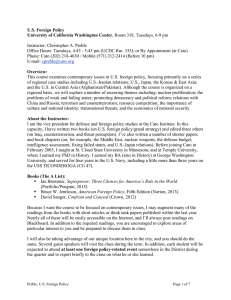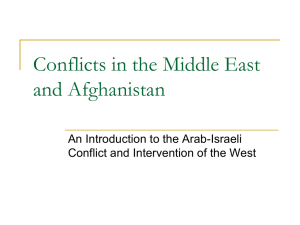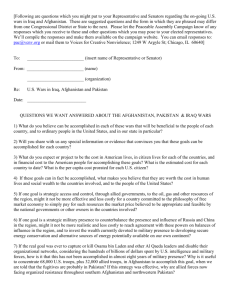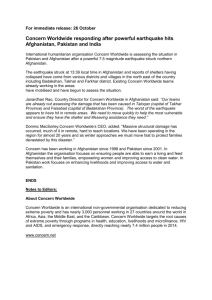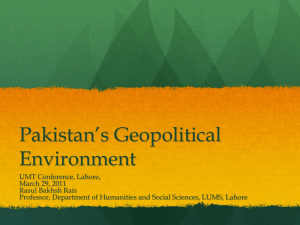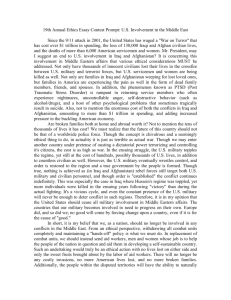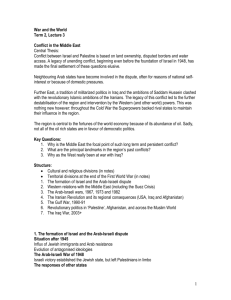HIST 421/521
advertisement
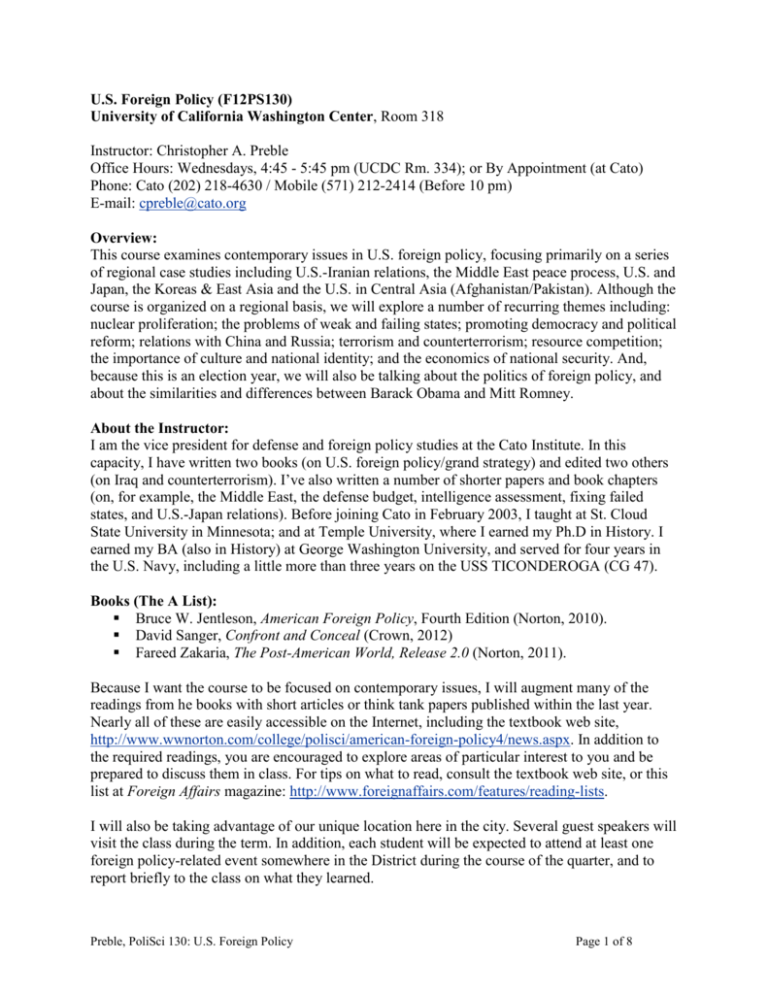
U.S. Foreign Policy (F12PS130) University of California Washington Center, Room 318 Instructor: Christopher A. Preble Office Hours: Wednesdays, 4:45 - 5:45 pm (UCDC Rm. 334); or By Appointment (at Cato) Phone: Cato (202) 218-4630 / Mobile (571) 212-2414 (Before 10 pm) E-mail: cpreble@cato.org Overview: This course examines contemporary issues in U.S. foreign policy, focusing primarily on a series of regional case studies including U.S.-Iranian relations, the Middle East peace process, U.S. and Japan, the Koreas & East Asia and the U.S. in Central Asia (Afghanistan/Pakistan). Although the course is organized on a regional basis, we will explore a number of recurring themes including: nuclear proliferation; the problems of weak and failing states; promoting democracy and political reform; relations with China and Russia; terrorism and counterterrorism; resource competition; the importance of culture and national identity; and the economics of national security. And, because this is an election year, we will also be talking about the politics of foreign policy, and about the similarities and differences between Barack Obama and Mitt Romney. About the Instructor: I am the vice president for defense and foreign policy studies at the Cato Institute. In this capacity, I have written two books (on U.S. foreign policy/grand strategy) and edited two others (on Iraq and counterterrorism). I’ve also written a number of shorter papers and book chapters (on, for example, the Middle East, the defense budget, intelligence assessment, fixing failed states, and U.S.-Japan relations). Before joining Cato in February 2003, I taught at St. Cloud State University in Minnesota; and at Temple University, where I earned my Ph.D in History. I earned my BA (also in History) at George Washington University, and served for four years in the U.S. Navy, including a little more than three years on the USS TICONDEROGA (CG 47). Books (The A List): Bruce W. Jentleson, American Foreign Policy, Fourth Edition (Norton, 2010). David Sanger, Confront and Conceal (Crown, 2012) Fareed Zakaria, The Post-American World, Release 2.0 (Norton, 2011). Because I want the course to be focused on contemporary issues, I will augment many of the readings from he books with short articles or think tank papers published within the last year. Nearly all of these are easily accessible on the Internet, including the textbook web site, http://www.wwnorton.com/college/polisci/american-foreign-policy4/news.aspx. In addition to the required readings, you are encouraged to explore areas of particular interest to you and be prepared to discuss them in class. For tips on what to read, consult the textbook web site, or this list at Foreign Affairs magazine: http://www.foreignaffairs.com/features/reading-lists. I will also be taking advantage of our unique location here in the city. Several guest speakers will visit the class during the term. In addition, each student will be expected to attend at least one foreign policy-related event somewhere in the District during the course of the quarter, and to report briefly to the class on what they learned. Preble, PoliSci 130: U.S. Foreign Policy Page 1 of 8 Assignments: All students must complete the following: 1) The mid-term exam, a take-home exam, will be handed out at the end of our normal class meeting on October 17th. The exam will test your understanding of the material discussed in the first half of the course, including both class discussion and assigned readings. The exam is due no later than the beginning of class the following week, October 24th. 2) One written assignment, a book report on your chosen “optional” book (From the B List – at the end of the syllabus). The goal of this assignment is to enable you to gain a fuller understanding of one of the regional case studies that is of particular interest to you, or which has special relevance to your other studies. The written portion of this assignment is a 3-4 page paper (maximum 1000 words) that briefly summarizes the book’s main themes, and which then considers how these themes fit within those of this course. Having completed this written assignment, you will be called upon to serve as a “resident expert” for class discussions. In this capacity, you are encouraged to suggest timely and relevant readings from the newspapers or blogs. (We will discuss this more during our first class). Your performance as resident expert will be considered within the class participation portion of your grade. The book report must be handed in no later than October 31st, but you are welcome to complete the assignment ahead of schedule. 3) The final exam, a take-home exam, will be handed out at the end of our normal class meeting on November 28th. The exam will test your understanding of the material discussed in the second half of the course, with an additional focus on the major themes discussed throughout. The exam is due no later than 9 am (Eastern Time) on Tuesday, December 4th. 4) Participate in class. This class consists of both lectures and class discussions, typically mixed together in the same class period. Participation in these discussions is essential to helping you understand the themes of the course and is therefore an important part of your grade. Of course, good attendance is also part of this assignment, since you cannot participate if you are not present for lectures and discussion. This is particularly important in a class such as this one that meets only once per week. It is also important to be prepared; you should complete, and be ready to discuss, the week’s reading assignment before you come to class. The textbook website includes chapter study guides, links to current foreign policy news, and quizzes that you can take for extra credit. Go to http://www.wwnorton.com/college/polisci/american-foreign-policy4/. Your “field trip” in the city also counts as part of your class participation grade. Grading: Grades will be based on the following percentages: Mid-Term Exam Written Assignment Book Report from the B List Final Exam Class Participation Preble, PoliSci 130: U.S. Foreign Policy 30% 20% 35% 15% Page 2 of 8 General Notes on Written Assignments and Grading: Written assignments must be typewritten, double-spaced, with one-inch margins in a standard 10- or 12-point font. Due dates for assignments will be strictly enforced. Papers must be handed in at the beginning of class on the given due date. Late papers will automatically receive a full letter grade reduction for every day they are late. Academic Honesty: Academic honesty affirms our regard for each other and the nature of our work together. Students should review closely and follow in both letter and spirit the principles expressed on academic integrity. (For example, see UC-Davis’s Code of Academic Conduct, http://sja.ucdavis.edu/cac.html.) All matters of academic honesty will be treated with the utmost seriousness, but I take plagiarism, in particular, very seriously. Do not plagiarize. I will never penalize you for doing research and citing your references. Do not pass off someone else’s work as your own. If you have any questions, do not hesitate to raise them with me. Plagiarized work will result in failure and referral to the appropriate campus administrative office. Preble, PoliSci 130: U.S. Foreign Policy Page 3 of 8 Class Schedule and Reading Assignments Lectures will address the major topics and themes of the course, and will correspond with assigned readings. You should complete the assigned readings before the beginning of class, and be prepared to participate in the class discussion. Week One – Course Introduction and Overview - Choice vs. Necessity Read – Jentleson, American Foreign Policy, Chapter 1 - The Strategic Context: Foreign Policy Strategy and the Essence of Choice (pp. 2-25); Readings 1.1 through 1.4 (pp. 198-215); and President Barack Obama, National Security Strategy, May 2010; “An American Century — A Strategy to Secure America’s Enduring Interests and Ideals,” A Romney For President White Paper, October 7, 2011. Week Two Part I – Foreign Policy Strategy in the 21st Century Read - Jentleson, American Foreign Policy, Chapter 6 - Foreign Policy Strategy and Foreign Policy Politics in a New Era (pp. 280-335); Reading 6.1 Charles Krauthammer, “The Unipolar Moment Revisited” (pp. 644-648); and Harvey Sapolsky, et al, “Restraining Order: For Strategic Modesty,” World Affairs, Fall 2009. Week Two Part II - The United States in East Asia, Part I - Japan (and China) Read – Jentleson, American Foreign Policy, Chapter 7 - Post-Cold War Geopolitics: Major Powers and Regions, Introduction (pp. 342-345); Asia (pp. 368-383); “Toward a Deeper and Broader U.S.–Japan Alliance: Building on 50 Years of Partnership,” Joint Statement of the U.S.– Japan Security Consultative Committee, June 21, 2011. B List – Friedberg, A Contest for Supremacy Halper, The Beijing Consensus Samuels, Securing Japan Week Three– The United States in East Asia, Part II - The Two Koreas (and China) Read – Jentleson, American Foreign Policy, Foreign Policy Politics: A Case Study, The China Lobbies (pp. 394-400); Sanger, Confront and Conceal, Part V - China and North Korea: The Rebalancing (pp. 367-427) B List – Cha, The Impossible State Chinoy, Meltdown Kang, China Rising Preble, PoliSci 130: U.S. Foreign Policy Page 4 of 8 Class Schedule and Reading Assignments (Continued) Week Four– Afghanistan, Pakistan, and the Problem of Failed States Read – Sanger, Confront and Conceal, Part I - Afghanistan and Pakistan: The Curse of Unfinished Business (pp. 1-138); Excerpts here and here from Rajiv Chandrasekaran, Little America: The War within the War for Afghanistan; and Justin Logan and Christopher Preble, “Washington's New Bogeyman: Debunking the Fear of Failed States,” Strategic Studies Quarterly, Summer 2010: 17-38. B List Books – Chandrasekaran, Little America Constable, Playing with Fire Kilcullen, Counterinsurgency Jones, In the Graveyard of Empires Rashid, Pakistan on the Brink Week Five– Iran, Iraq and the Persian Gulf Read – Sanger, Confront and Conceal, Prologue (pp. ix-xiii); and Part II - Iran: The Zone of Immunity, (pp. 139-240); Jentleson, American Foreign Policy, Chapter 8 - The Middle East: A Special Focus, Introduction: September 13, 1993, to September 11, 2001: From Hope to Tragedy (pp. 405-407); Operations Desert Shield and Desert Storm: The 1990-91 Persian Gulf War (pp. 407-409); 9/11 and the Bush War on Terrorism (pp. 409-418); The Iraq War (pp. 429-435); Key Issues and Initial Obama Strategies (pp. 435-448); Foreign Policy Politics: Terrorism and the Iraq War (pp. 456-472); Chapter Summary: (pp. 472-473) B List – Haass, War of Choice, War of Necessity Kinzer, All the Shah's Men Majd, The Ayatollah Begs to Differ Parsi, A Single Roll of the Dice Slavin, Bitter Friends, Bosom Enemies The Mid-Term Exam will be handed out at the end of this class. Week Six– Can There Be Peace? Israelis and Palestinians Read – Dani Dayan, “Israel’s Settlers Are Here to Stay,” New York Times, July 26, 2012; Jentleson, American Foreign Policy, The Arab-Israeli Conflict (pp. 448-456) B List Books – Freedman, A Choice of Enemies Kurtzer, Negotiating Arab-Israeli Peace Lerner, Embracing Israel/Palestine: A Strategy to Heal and Transform the Middle East Miller, The Much Too Promised Land Ross and Makovsky, Myths, Illusions, and Peace The Mid-Term Exam is due at the beginning of class. Preble, PoliSci 130: U.S. Foreign Policy Page 5 of 8 Class Schedule and Reading Assignments (Continued) Week Seven– The United States of America and the (Sort of) United States of Europe Read - Jentleson, American Foreign Policy, Europe and Russia (pp. 346-367); Robert M. Gates, “The Security and Defense Agenda (Future of NATO),” Brussels, Belgium, June 10, 2011; Barry Pavel and Jeff Lightfoot, “The Transatlantic Bargain After Gates,” part of “Smart Defense and the Future of NATO: Can the Alliance Meet the Challenges of the Twenty-First Century,” Chicago Council on Foreign Affairs, March 2012. B List Books – Davidson, America’s Allies and War Hill, Europe’s Promise Marquand, The End of the West Sloan, Permanent Alliance? The book review on your chosen B List book, is due at the beginning of class. Week Eight– The Fires Next Door - The United States in the Western Hemisphere (Guest Lecturer: Ted Galen Carpenter, Senior Fellow, Cato Institute) Read – Jentleson, American Foreign Policy, Latin America (pp. 383-391); Ted Galen Carpenter, “Drug Mayhem Moves South,” The National Interest (January-February 2012). B List Books – Carpenter, The Fire Next Door Erikson, The Cuba Wars Grayson, Mexico: Narco-Violence and a Failed State? Reid, Forgotten Continent Schoen and Rowan, The Threat Closer to Home Week Nine– Arab Spring: Revolution and Reform in Egypt, Tunisia, Libya, and Syria Read – Sanger, Confront and Conceal, Part IV - Arab Spring: The Revolts, and the Rise of the Brotherhood (pp. 271-366); Jentleson, American Foreign Policy, Chapter 9 - Never Again or Yet Again? Genocide and Other Mass Atrocities (pp. 480-522); and Readings 9.1 through 9.4 (pp. 672-684) B List Books – Ghonim, Revolution 2.0 Lynch, The Arab Uprising Nasr, Forces of Fortune Stack, Every Man in this Village Is a Liar Wright, Rock the Casbah Preble, PoliSci 130: U.S. Foreign Policy Page 6 of 8 Class Schedule and Reading Assignments (Continued) Week Ten– Choice vs. Necessity, Revisited - Debating America’s Place in the World Read - Zakaria, The Post-American World, Release 2.0 B List Books – Bacevich, Washington Rules Kagan, The World America Made Kupchan, No One’s World Gelb, Power Rules Mandelbaum, The Frugal Superpower The Final Exam will be handed out at the end of class, and is due no later than 9 am (Eastern Time) on Tuesday, December 4th. Preble, PoliSci 130: U.S. Foreign Policy Page 7 of 8 The B List (Student Expert Books – Every student must pick one) Bacevich, Andrew. Washington Rules: America’s Path to Permanent War (Metropolitan, 2010). Carpenter, Ted Galen. The Fire Next Door: Mexico’s Drug Violence and the Danger to America (Cato Institute, 2012). Cha, Victor. The Impossible State: North Korea, Past and Future (Ecco, 2012). Chandrasekaran, Rajiv. Little America: The War Within the War for Afghanistan (Knopf, 2012) Chinoy, Mike. Meltdown: The Inside Story of the North Korean Nuclear Crisis (St. Martin’s, 2010). Constable, Pamela. Playing with Fire: Pakistan at War with Itself (Random House, 2011). Davidson, Jason. America's Allies and War: Kosovo, Afghanistan, and Iraq (Palgrave Macmillan, 2011). Erikson, Daniel P. The Cuba Wars: Fidel Castro, the United States, and the Next Revolution (Bloomsbury, 2009). Freedman, Lawrence. A Choice of Enemies: America Confronts the Middle East (PublicAffairs, 2008). Friedberg, Aaron. A Contest for Supremacy: China, America, and the Struggle for Mastery in Asia (Norton, 2011). Gelb, Leslie. Power Rules: How American Common Sense Can Rescue American Foreign Policy (Harper, 2009). Ghonim, Wael. Revolution 2.0: The Power of the People Is Greater Than the People in Power (Houghton Mifflin, 2012). Grayson, George W. Mexico: Narco-Violence and a Failed State? (Transaction, 2009). Haass, Richard. War of Necessity, War of Choice: A Memoir of Two Iraq Wars (Simon and Schuster, 2009). Halper, Stefan. The Beijing Consensus: How China's Authoritarian Model Will Dominate the 21st Century (Basic, 2010). Hill, Steven. Europe's Promise: Why the European Way Is the Best Hope in an Insecure Age (Univ. of California, 2010). Jones, Seth G. In the Graveyard of Empires: America's War in Afghanistan (Norton, 2009). Kagan, Robert. The World America Made (Knopf, 2012). Kang, David C. China Rising: Peace, Power, and Order in East Asia (Columbia Univ. Press, 2008). Kilcullen, David. Counterinsurgency. (Oxford, 2010). Kinzer, Stephen. All the Shah's Men: An American Coup and the Roots of Middle East Terror (Wiley, 2nd edition, 2008). Kupchan, Charles. No One’s World: The West, the Rising Rest, and the Coming Global Turn (Oxford, 2012). Kurtzer, Daniel. Negotiating Arab-Israeli Peace: American Leadership in the Middle East (USIP, 2008). Lerner, Michael. Embracing Israel/Palestine: A Strategy to Heal and Transform the Middle East (North Atlantic, 2011). Lynch, Marc. The Arab Uprising: The Unfinished Revolutions of the New Middle East (Public Affairs, 2012). Mandelbaum, M. The Frugal Superpower: America's Global Leadership in a Cash-Strapped Era (Public Affairs, 2010). Majd, Hooman. The Ayatollah Begs to Differ: The Paradox of Modern Iran (Doubleday, 2008/Anchor, 2009). Marquand, David. The End of the West: The Once and Future Europe (Princeton, 2011). Miller, Aaron D. The Much Too Promised Land: America's Elusive Search for Arab-Israeli Peace (Bantam, 2008). Nasr, Vali. Forces of Fortune: The Rise of the New Muslim Middle Class and What It Will Mean… (Free Press, 2009). Parsi, Trita. A Single Roll of the Dice: Obama’s Diplomacy with Iran (Yale University Press, 2012). Rashid, Ahmed. Pakistan on the Brink: The Future of America, Pakistan and Afghanistan (Viking, 2012). Reid, Michael. Forgotten Continent: The Battle for Latin America’s Soul (Yale, 2007). Ross, D. and Makovsky, D. Myths, Illusions, and Peace: Finding a New Direction for America... (Viking, 2009). Samuels, Richard J. Securing Japan: Tokyo's Grand Strategy and the Future of East Asia (Cornell, 2008). Schoen, D. and Rowan, M. The Threat Closer to Home: Hugo Chavez and the War against America (Free Press, 2009). Slavin, B. Bitter Friends, Bosom Enemies: Iran, the U.S., and the Twisted Path to Confrontation (St. Martin’s, 2007). Sloan, Stanley R. Permanent Alliance?: NATO and the Transatlantic Bargain from Truman to Obama (Continuum, 2010). Stack, Megan. Every Man in this Village is a Liar: An Education in War (Doubleday/Anchor, 2010/2011). Wright, Robin. Rock the Casbah: Rage and Rebellion Across the Islamic World (Simon and Schuster, 2011). Preble, PoliSci 130: U.S. Foreign Policy Page 8 of 8
